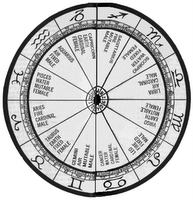If you want to annoy a militant feminist (and who, from time to time, does not?), it is necessary only to make some confident pronouncement along the lines of "women are more (or less) [….] than men, of course". The response will be to the effect that (a) they aren’t and (b) if they are, it is because of social conditioning/centuries of repression by men/under-nourishment, etc. This response will in some cases be quite justified—generalisations about gender differences are often inaccurate and to be deplored.
However, there is one which I have always taken for granted and which can be attributed, as far as I can imagine, only to some innate disparity between the male and the female psyche. It is this: women tend to be more superstitious than men.
My belief that this is so was based merely on casual observation, until it was questioned the other day by a (totally unsuperstitious) woman for whose intellect I have the greatest respect. "Nonsense", she said, robustly, "there are just as many men as women who believe in preposterous things". Clearly, my empirical belief would have to be tested.
I decided to pick one particular superstition, since many seem to appeal to men and women equally (homeopathy, say); I couldn’t think of one which mostly men go for (though there must be some: UFOs, possibly?). No-one much thinks about spiritualism these days, and I didn’t want to look at religious beliefs because they are too heavy-weight a subject for a playful little enquiry like this.
 So I chose astrology. Judging by the space given to it in magazines, and the serious money being made by the charlatans who peddle it, an interest in this drivel must be widespread, even if people who look up their stars are not necessarily taking any of it seriously. But is it mostly men or women who actually read the stuff?
So I chose astrology. Judging by the space given to it in magazines, and the serious money being made by the charlatans who peddle it, an interest in this drivel must be widespread, even if people who look up their stars are not necessarily taking any of it seriously. But is it mostly men or women who actually read the stuff?
I have to say that my results were as conclusive as any amateur, unscientific test (small and unadjusted sample and generally poor methodology) could possibly produce.
I began by asking friends and family whether they believed in astrology, but I couldn’t find anyone who gave any kind of positive answer (sceptical lot, my friends and family), though a few said they thought it was a bit of fun . Then it occurred to me that I could widen the field of enquiry quite simply, without going to much trouble. Most blogs offer some kind of profile of the author ("About Me") and the bloghoster provides suggestions for personal details to fill in: occupation, place of residence, gender, interests, favourite (sorry, favorite) books, films, Astrological Sign and Zodiac Year. I guessed that anyone who thinks it worthwhile to fill in these last two details may not actually believe in astrology but probably at least regards it as something more than a silly superstition and a lucrative fraud.
So over two or three months I looked at all the profiles linked to any blogs I happened to visit. This gave me a sample of 32 men and 46 women, and I found that 15.6% of the men and 73.7% of the women wanted the world to know that they were born under the sign of Capricorn, in the year of the Ox*, or whatever.
I believe this shows that women tend to be more superstitious than men.
Donald Swann had a song which gave me the title for this post:
MY HOROSCOPE
Jupiter's passed through Orion,
And come into conjunction with Mars.
Saturn is wheeling through infinite space,
To its pre-ordained place in the stars.
And I gaze at the planets in wonder,
At the trouble and time they expend.
All to warn me to be careful.....
In dealings involving a friend!
[More about horoscopes HERE]
*Actually, Chinese star signs have nothing to do with astrology, though horoscopes have developed around them much as monthly horoscopes in the West have been developed for the different signs of the zodiac. For example, a Chinese horoscope may predict that a person born in the Year of the Horse would be, "cheerful, popular, and loves to compliment others". These horoscopes are amusing, but not taken seriously by the Chinese.
Every year is assigned an animal name or "sign" according to a repeating cycle: Rat, Ox, Tiger, Rabbit, Dragon, Snake, Horse, Sheep, Monkey, Rooster, Dog, and Boar; every twelve years the same animal name or "sign" would reappear.
Thus, the signs serve a useful social function for finding out people’s ages, avoiding having to ask directly how old a person is; you can just ask what is his or her animal sign. This would place that person’s age within a cycle of 12 years, and with a bit of common sense the exact age can be deduced.













